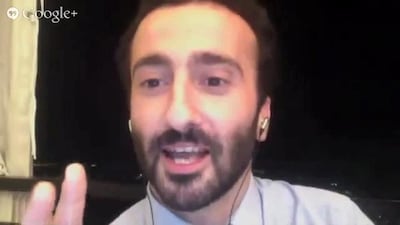What do you get when you cross video-chatting services such as Google Hangouts and Skype with live theatre?
The answer is a brand-new art form that is being pioneered by performers in cities such as Tunis, Beirut and Dubai.
“It’s the future,” says the Lebanese writer, actor and director Lucien Bourjeily, who lives and works in Beirut. “At the moment it’s avant-garde, but it will become the norm.”
Last July, Bourjeily collaborated with Elastic Future, an experimental theatre company that started in San Francisco but is now based in London, on a play called Peek A Boo for the London International Festival of Theatre (Lift). Five actors, playing spies, programmers and online peep-show entertainers, were divided between New York, London and Beirut, improvising dialogue as they interacted via streaming video. Audience members around the world watched in real-time by signing into Google Hangouts or watching the feed on Elastic Future’s web page. They also interacted with characters on Twitter and took part in a post-show Q&A.
“It was a breakthrough,” says Bourjeily of the performance, which followed just a week of online workshops and involved some quick thinking from the actors when there were glitches in the internet connection from New York. “It opened my eyes to so many possibilities for how to create a new type of immersive theatre.”
Erin Gilley, Elastic Future’s artistic director, says she learnt a lot from the experience and is eager to keep stretching the limits of the medium. She’s planning another work for this year’s Lift to be streamed online in July, with actors performing live via webcam from Ghana, Portugal and the United Kingdom.
“Theatre can’t exist without an audience and we’re trying to creatively explore what that means,” says Gilley of the work-in-progress. “The goal is for it to feel like you’re sitting in a theatre with other people, even though watching it will be a private experience.”
Gilley is avoiding screening the feed in an auditorium, in case the process prevents her from “discovering ways to create that feeling online”.
Much like Bourjeily, Gilley is evangelical about the benefits of this new, hybrid art form. For starters, it can bypass censors in countries such as Lebanon, where playwrights are required to submit their work to a bureau for approval. Performing online is cheaper than renting a space and flying in actors and it grants access to audiences from all over the world. It creates novel ways for artists scattered all over the globe to cooperate and to interact with viewers.
It can also turn practical constraints into aesthetic virtues. The Tunisian siblings Sofiane and Selma Ouissi have been creating performance art together since they were children. While training as dancers, they moved from Tunis to Paris. Sofiane returned home in 2006, yet the duo continued to choreograph together on Skype.
They recently developed an “interactive installation” called Here(s), which involves both siblings dancing simultaneously in their own respective homes. The performances are relayed by a live internet feed to an art gallery and projected onto a split screen. After being staged in Berlin in 2012, the piece was performed again and broadcast live as part of the Abu Dhabi Art Fair and the Sharjah Biennial last year.
Communicating remotely – being interconnected but isolated – is an experience that’s “common to our time”, the duo have pointed out in an interview with the webzine Nafas. In Here(s) they appear sometimes as ghostly forms inhabiting the same space; sometimes as disconnected body parts. Their method of working was born out of necessity, but they’ve turned it into an apt expression of contemporary life.
In Dubai and New York, members of the multidisciplinary ensemble Loom are making parallel discoveries about the kinds of collaboration that the internet enables. Loom was founded in New York, but it went multinational when its founding members Raphael Sacks and Neva Cockrell moved to Dubai last summer. The company will be putting on its first fully produced evening performance, Say I Am You, at the thejamjar in Dubai for three nights this weekend.
As technology develops, the artistic possibilities multiply. “We have new ways of getting emotionally connected to our audience,” is how Bourjeily puts it. “The sky is the limit.”
artslife@thenational.ae

